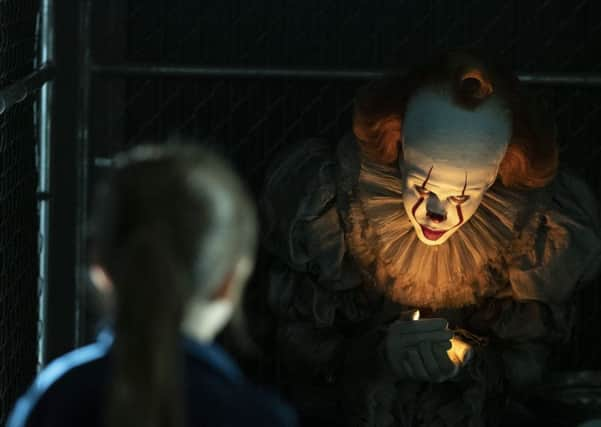Film reviews: IT: Chapter Two | Memory: The Origin of Alien | Seahorse: The Dad Who Gave Birth | Rojo


IT: Chapter Two (15) **
Memory: The Origin of Alien (15) ****
Seahorse: The Dad Who Gave Birth (15) ****
Rojo (15) ***
Early on in IT: Chapter Two we’re introduced to James McAvoy as the grown-up version of Bill, one of the young teenagers terrorised by Pennywise the clown in 2017’s surprisingly good adaptation of the early years part of Stephen King’s doorstopper of a novel. Like a lot of King protagonists he’s a writer – in this instance a successful novelist who’s branched out into adapting his own work for the big screen. But as noted by both his actress wife (played by Jess Weixler) and his director (a nice little cameo from Peter Bogdanovich), his endings suck. In fact his endings are so routinely terrible, this becomes a running gag in the movie, with even King himself – playing the proprietor of a junk shop – popping up to tell him so. Unfortunately the gag is on us, playing more like a tacit admission of the filmmaker’s own failure to wrestle the adult section of King’s unwieldy novel into a satisfying conclusion.
It may boast a bigger budget, more elaborate effects and a somewhat starrier cast (well, McAvoy and Jessica Chastain), but returning director Andy Muschietti – no doubt buoyed by the unexpected success of the first film – seems to have wilfully misunderstood the difference between a miniseries and a movie. Never knowingly cutting to the chase when three or four extra scenes can be deployed to set up a jump scare or a plot twist that any seasoned moviegoer can see coming a mile off, he’s delivered 170 tedious minutes that leave us in the boring position of being forever a few steps ahead of the characters. True, those characters are suffering from collective amnesia having suppressed their coulrophobic fears following the events in the first film. But even so, Muschietti keeps padding the film out with extended flashbacks to their childhoods, bringing back the younger cast for a second go round instead of finding ways to let his very capable adult actors internalise and express the various ways these otherwise successful adults continue to be haunted by the trauma of IT.
Advertisement
Hide AdNot that the adult cast – which also includes Bill Hader, Isaiah Mustafa, Jay Ryan and James Ransone – have much to work with. The characters have been too cornily conceived to do anything meaningful with the story’s themes and no one is more ill-served here than Chastain, whose performance as the older Beverly consists largely of screaming and trying to figure out which of her childhood friends she’s really in love with.
The plot, such as it is, takes place 27 years on and has the self-styled Losers’ Club staying true to their childhood pact to return to their home of Derry should Pennywise (Bill Skarsgård) ever return. What follows is a lot of excruciating mumbo jumbo as the gang, led by Mike (he’s the only one who never left home), reckon with their individual pasts while attempting to enact an elaborate ritual that will purge the town of Pennywise once and for all. Like the first film, the violence meted out to the victims can be brutal; unlike the first film, the scares are minimal, with the big set-pieces falling back on ghoulish gags that lack menace. Talk about rubbish endings.
It’s 40 years since Ridley Scott’s sci-fi classic Alien helped transform modern cinema. In Memory: The Origins of Alien, director Alexandre O Philippe (The People vs George Lucas) delivers a fantastically comprehensive deep-dive into the many sources that Scott, original screenwriter Dan O’Bannon and conceptual artist HR Giger drew on in order to illuminate why it had such an impact. The film certainly gives O’Bannon (who passed away in 2009) the due he never felt he got, though in a film about artistic collaboration, it’s a little short-sighted to then play favourites by trying to ridicule Walter Hill and David Giler, who produced the film, extensively rewrote O’Bannon’s script, came up with the malevolent android memorably played by Ian Holm and hired Ridley Scott to direct it in the first place. Still, even if you know the movie backwards, the trenchant analysis will have you looking at it in a new light and, in an age where most movies resemble other movies, Phillippe’s excavations into the many artistic, historical and psychological influences the film’s main players brought to the table is a testament to the benefits of having as broad a range of influences as possible when striving to create something original.
Jeanie Findlay’s latest documentary, Seahorse: The Dad Who Gave Birth, commendably sidesteps the minefield of gender politics implicit in its Twitter-taunting title by offering a sensitive, empathetic portrait of a trans man’s emotional journey to conceive and have a baby. What emerges as we follow introverted journalist Freddy McConnell on his journey to fatherhood is a fascinating and clear-eyed look at the positive ways people can make a difference by being true to themselves and living their lives accordingly.
Set in Buenos Aires on the eve of a dictatorial political coup, Argentine director Benjamín Naishtat’s 1970s-set moral thriller Rojo examines the rise of fascism and the complicity of those who let it happen. Though the missing person investigation that embroils the film’s bourgeois protagonist (Darío Grandinetti) can sometimes feel a little abstract, the sense of mounting horror and dread is effectively and stylishly rendered. ■